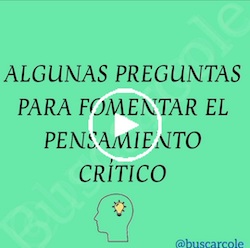
School discipline is a fundamental aspect of the educational process, as it contributes to the integral development of students. Through discipline, students learn to respect rules and limits, to be responsible for their actions and to work respectfully as a team.
In addition, school discipline helps create an environment conducive to learning, where students can concentrate on their academic tasks and make the most of opportunities for personal and academic growth. It also promotes peaceful coexistence and mutual respect among members of the educational community.
In summary, school discipline is essential to foster values such as responsibility, respect and self-control, which are fundamental for the development of social and emotional skills in students.
Critical thinking is essential in making informed decisions and solving complex problems
Critical thinking is an important skill that involves objectively and rationally analyzing information, identifying biases and prejudices, questioning assumptions, and reaching informed conclusions.
It has its roots in ancient Greek philosophy, especially in the teachings of philosophers such as Socrates, Plato and Aristotle. These thinkers promoted the importance of questioning, analyzing and reflecting on established ideas and beliefs, encouraging the search for truth through dialogue and rational argumentation. Their focus on logic, sound argumentation and self-evaluation has influenced the way we understand critical thinking today.
Socrates who was a Greek philosopher very influential in the development of critical thinking, is known for his teaching method, mayeutics, which involved asking his students questions to help them discover the truth for themselves. Socrates believed in the importance of questioning established beliefs and in constant self-evaluation as a means to wisdom. He encouraged rational argumentation and the search for truth through dialogue.
Discipline and critical thinking: fundamental aspects in education
Constant self-evaluation and personal discipline are essential to the attainment of wisdom and virtue. Socrates encouraged the practice of questioning established beliefs, examining one's own ideas and being willing to change one's mind when stronger arguments were presented.
It is this attitude of intellectual humility and openness to dialogue that enables us to develop sharp and deep critical thinking.
In conclusion, discipline and critical thinking are pillars in education as they allow us to question, reflect and reach conclusions based on reason and truth.
